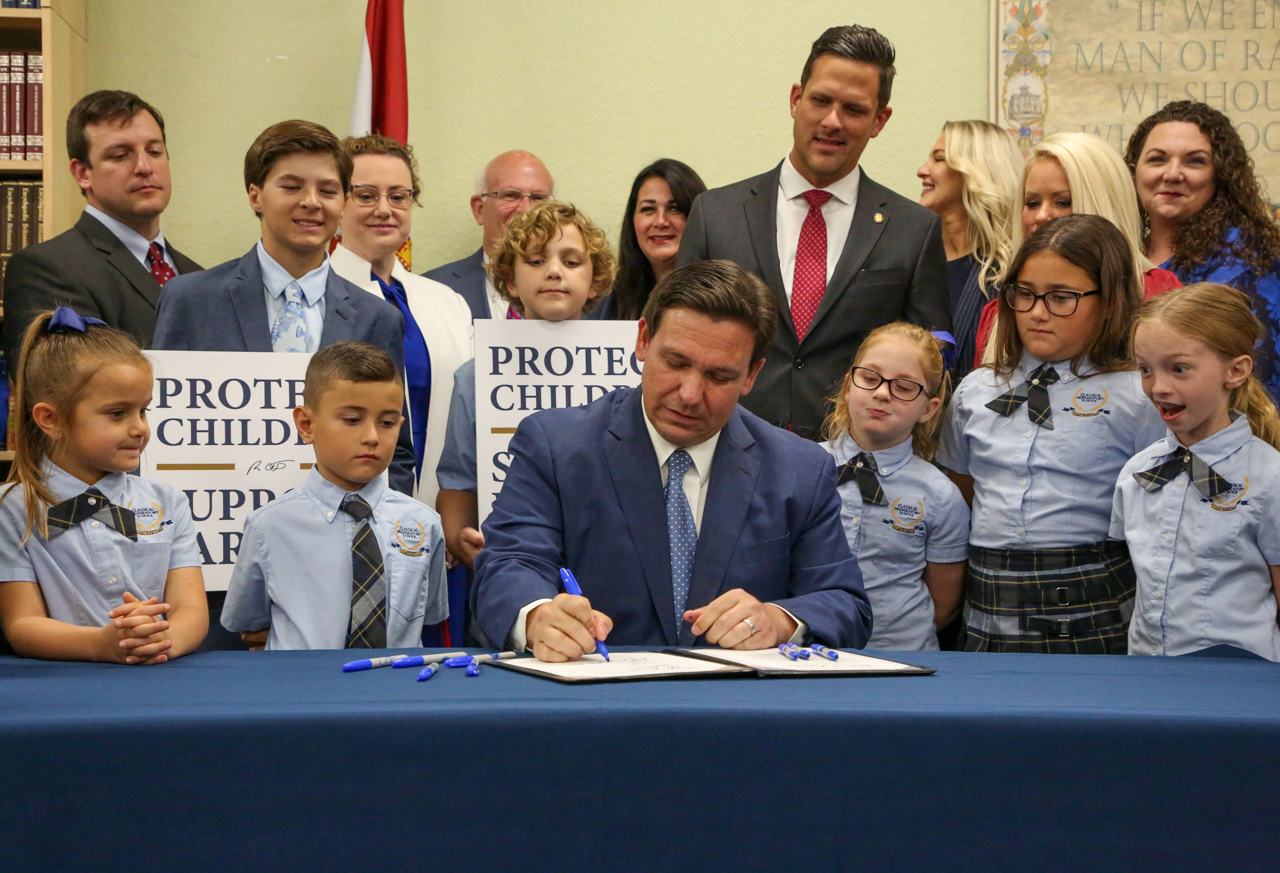As more and more Republican-led states pass restrictive legislation with regards to the rights of LGBTQ+ people, there are concerns that Florida’s new law, dubbed the “Don’t Say Gay” law could have far reaching impact beyond the sunshine state.

“I’m devastated by laws like this,” Rob Hill, state director of Human Rights Campaign Mississippi, said. “They impact the youth in Florida, but the news of this spreads beyond Florida and has an impact on LGBTQ+ plus folks all over the country.”
On March 28, Florida Gov. Ron DeSantis signed into law a bill that makes it illegal for teachers to educate students on sexual orientation and gender identity from kindergarten to third grade. The law will officially go into effect on July 1.
“Classroom instruction by school personnel or third parties on sexual orientation or gender identity may not occur in kindergarten through grade three or in a manner that is not age appropriate or developmentally appropriate for students in accordance with state standards,” reads the bill’s text.
Titled the “Parental Rights in Education” bill, House Bill 1557 was passed by Florida’s Republican House and Senate by leaders who argue that the legislation is for students’ protection.
“We will make sure that parents can send their kids to school to get an education, not an indoctrination,” DeSantis said in a speech before signing the bill.
DeSantis and the Florida legislators who advanced the bill are receiving blowback from individuals and organizations who maintain that the law marginalizes and infringes on the rights of LGBTQ+ individuals. Hill and the Human Rights Campaign, a nationwide organization that fights for LGBTQ+ equality and inclusion, oppose the new law.
“This is very dangerous. I mean, the facts are already that LGBTQ+ kids are some of the most vulnerable in our student population,” Hill said. “We know that 86% of (kids) reported being bullied, assaulted, and they’re in their school setting. We know that, you know, LGBTQ+ youth, disproportionately attempt suicide.”
Research and statistics indicate that LGBTQ+ youth are at a higher risk for committing suicide, primarily because of how they are mistreated and stigmatized in society according to The Trevor Project.
“Laws like this (by) leaders who are elected to protect us to make us safe, they send an opposite message,” Hill said. “And they also, embolden those who are prejudiced, bigoted against LGBTQ+ people and in any marginalized community.”
Cat Llanos is a University of Mississippi sophomore biological sciences major from Ft. Lauderdale, Florida. She said she was upset to hear that the legislation was advancing and eventually signed into law.
“I think it’s ridiculous, the fact that instead of moving forward in time, we are now going backwards only because specific politicians believe that they should infringe their beliefs on us and that they have the power to move a bill forward just because they are who they are,” she said. “I don’t think this law protects children at all.”
Familiar with both Mississippi and Florida, Llanos believes it is likely that similar legislation could be passed in Mississippi.
“I think that there is a big possibility that it can come down the pipe in Mississippi just as it has in both Florida and Texas,” she said.
Hill expressed similar concerns.
“It’s always a possibility. I would hope that our leaders would see the kind of response that this negative legislation has evoked from leaders, from corporate leaders, from any number of folks in opposition to this. Mississippi already struggles economically. A bill like this would set us back,” he said. “Who wants to come to a state where there is legislation that is intended to to hurt people, in this case, LGBTQ+ youth and their families and their teachers?”
Mississippi has already advanced and passed its share of controversial LGBTQ+ legislation, most recently with Gov. Tate Reeves’ signage of SB 2536, a law that forces public schools, public institutions of higher learning or institutions of higher learning that are members of the NCAA, NAIA, MHSAA or NJCCA to designate athletic teams or sports according to biological sex.
Robert Foster, former Mississippi state representative and candidate for governor, has recently come under fire recently for tweeting that supporters of transgender rights should be “lined up against the wall before a firing squad and sent to early judgement.”
Florida’s new law will likely face legal challenges due to questions of unconstitutionality and possible violation of free speech laws. Hill says that the key to fighting legislation like this is to share your story and keep legislators accountable.
“We need young people to speak out, to show up at the capitol, to call your legislators and have conversations with them, especially LGBTQ+ students. Talk to your legislator, whether he or she is a Republican or a Democrat, tell your story,” he said. “That’s the number one way to change hearts and minds around these issues and perhaps to avoid bad legislation like this in the future. And if your stories aren’t listened to show up at the Capitol now demand that leaders reject this kind of discriminatory legislation.”

















